-
 Salah closer to AFCON glory as Egypt dethrone champions Ivory Coast
Salah closer to AFCON glory as Egypt dethrone champions Ivory Coast
-
O'Neil ends 'crazy three days' with Strasbourg cup canter

-
 Mitchell leads Cavs over T-Wolves
Mitchell leads Cavs over T-Wolves
-
O'Neil ends 'crazy few days' with Strasbourg cup canter

-
 Argentina wildfire burns over 5,500 hectares: governor
Argentina wildfire burns over 5,500 hectares: governor
-
Byrne late penalty fires Leinster into Champions Cup last 16

-
 Roma beat Sassuolo to close in on Serie A leaders Inter
Roma beat Sassuolo to close in on Serie A leaders Inter
-
Villa's FA Cup win at Spurs leaves Frank on the brink

-
 Osimhen focused on Nigeria glory not scoring record
Osimhen focused on Nigeria glory not scoring record
-
Undav calls shots as Stuttgart thump Leverkusen

-
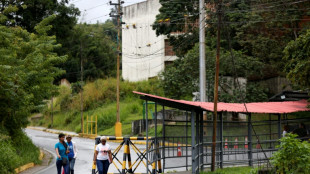 Venezuelan prisoners smile to hear of Maduro's fall
Venezuelan prisoners smile to hear of Maduro's fall
-
Thousands of Irish, French farmers protest EU-Mercosur trade deal
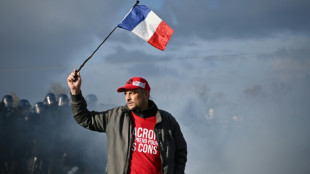
-
 Kiplimo captures third straight world cross country title
Kiplimo captures third straight world cross country title
-
Osimhen leads Nigeria past Algeria into AFCON semi-finals

-
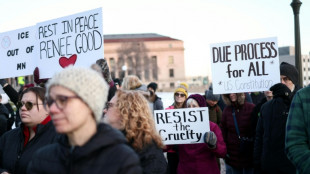 Weekend of US protests after woman killed by immigration agent
Weekend of US protests after woman killed by immigration agent
-
Monaco cling on with 10 men to avoid French Cup shock

-
 Rooney close to tears as brother masterminds FA Cup history
Rooney close to tears as brother masterminds FA Cup history
-
Semenyo scores on Man City debut in 10-goal rout of Exeter

-
 Villarreal sink Alaves to stay in La Liga hunt
Villarreal sink Alaves to stay in La Liga hunt
-
Bristol, Glasgow reach Champions Cup last 16

-
 Freiburg beat 10-man Hamburg to climb to eighth in the Bundesliga
Freiburg beat 10-man Hamburg to climb to eighth in the Bundesliga
-
Venezuela loyalists to rally one week after Maduro's capture
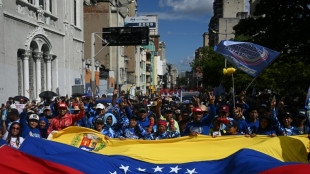
-
 Football: Five memorable FA Cup upsets
Football: Five memorable FA Cup upsets
-
Odermatt warms up for Winter Games with Adelboden giant slalom win

-
 Benin showcases culture with Vodun Days
Benin showcases culture with Vodun Days
-
Holders Crystal Palace stunned by Macclesfield in biggest ever FA Cup shock

-
 Odermatt wins Abelboden giant slalom for sixth World Cup success of season
Odermatt wins Abelboden giant slalom for sixth World Cup success of season
-
Poland reach United Cup final despite Swiatek loss to Gauff

-
 India's Gill calls it 'destiny' after shock T20 World Cup snub
India's Gill calls it 'destiny' after shock T20 World Cup snub
-
'Driven' Vonn storms to 84th World Cup win in Austrian downhill

-
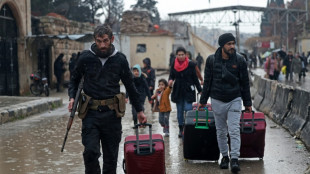 Syrian army says stopping Aleppo operations, but Kurds deny fighting over
Syrian army says stopping Aleppo operations, but Kurds deny fighting over
-
Thousands of Irish farmers protest EU-Mercosur trade deal

-
 Vonn storms to 84th World Cup win in Austrian downhill
Vonn storms to 84th World Cup win in Austrian downhill
-
Real Madrid not 'kamikaze' with Mbappe health: Alonso

-
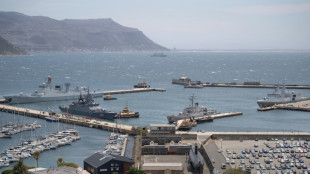 South Africa defends naval drills with Iran, Russia as 'essential'
South Africa defends naval drills with Iran, Russia as 'essential'
-
Alcaraz beats Sinner in sold-out South Korea exhibition match

-
 'Racing against time': Death toll rises after Philippines trash site collapse
'Racing against time': Death toll rises after Philippines trash site collapse
-
'American? No!' says Greenland after latest Trump threat
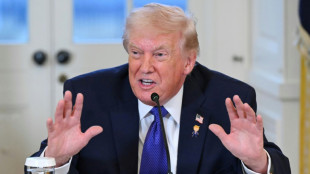
-
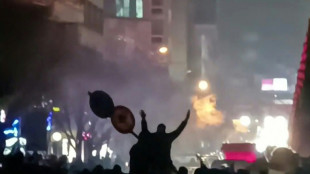 New rallies in Iran as son of shah calls for city centres to be seized
New rallies in Iran as son of shah calls for city centres to be seized
-
Greenland's parties say they don't want to be under US
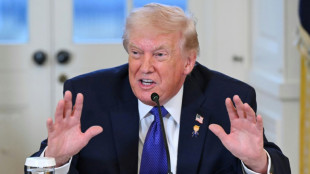
-
 Switzerland battle into United Cup final in searing Sydney heat
Switzerland battle into United Cup final in searing Sydney heat
-
Syrian army says swept Aleppo district after clashes with Kurdish fighters
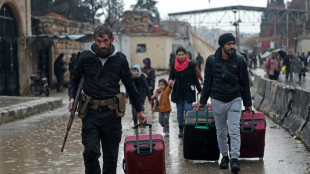
-
 Short-handed Thunder rally to edge Grizzlies
Short-handed Thunder rally to edge Grizzlies
-
Neighbors in Minneapolis protect each other from US immigration police
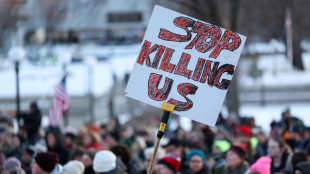
-
 Glenn tops Liu for US figure skating gold as American women eye Olympics
Glenn tops Liu for US figure skating gold as American women eye Olympics
-
Death toll climbs after trash site collapse buries dozens in Philippines

-
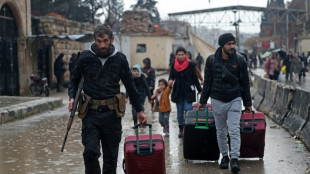 Syria urges Kurdish fighters to surrender after ramping up Aleppo operation
Syria urges Kurdish fighters to surrender after ramping up Aleppo operation
-
Sabalenka into third straight Brisbane final ahead of Australian Open

-
 Chinese villagers struggle for heat as gas subsidies fade
Chinese villagers struggle for heat as gas subsidies fade
-
North Korea accuses South of another drone incursion

Venezuela braces after Strike
The first kinetic U.S. strike aimed at a suspected cartel vessel departing Venezuela has jolted the region and pushed Caracas onto a war-footing. In Washington, officials frame the action as a necessary escalation in a broader campaign against transnational crime. In Caracas, leaders denounce it as a pretext for intervention. Between these poles lies a volatile mix of military signaling, legal ambiguity, and the risk of miscalculation.
In the early hours of this week’s operation, a U.S. Navy asset destroyed a speedboat that American officials said was transporting narcotics and crewed by members of a violent gang with roots in Venezuela. The attack, which killed multiple occupants, marked a departure from the long-standing pattern of maritime interceptions and arrests in the Caribbean. It was a strike designed to deter—and to advertise a new threshold.
Inside the United States, the move sits within a sharper doctrine: treating major Latin American criminal organizations as terrorist entities and, when judged necessary, applying military force beyond U.S. borders. Recent designations and rhetoric have been used to justify an expanded toolset—sanctions, asset freezes, forward deployments, and, now, lethal action at sea. Critics warn that such steps outpace statutory authorities and established international law. Supporters counter that cartels operate as militarized networks and should be met accordingly.
In the days following the strike, senior officials signaled that more operations are on the table. Additional U.S. aircraft have moved into the Caribbean theater, and planners are weighing options that range from intensified maritime interdiction to potential strikes on cartel infrastructure. The visible buildup—paired with high-profile statements from the White House—aims to deter trafficking networks and pressure Caracas to curb their reach.
Venezuela has answered with its own show of force. President Nicolás Maduro ordered troop surges to coastal and border states identified as smuggling corridors, while defense chiefs pledged large-scale counter-narcotics operations under national command. The message is twofold: sovereignty will be defended, and Caracas—not Washington—will police Venezuela’s territory and adjacent waters. The moves underscore how quickly an anti-cartel push can harden into state-to-state confrontation.
The legal terrain remains unsettled. Absent a specific congressional authorization for the use of force against Venezuela, and without a U.N. mandate, scholars question the durability of a self-defense rationale for strikes beyond interdiction at sea. Even advocates of a tougher line acknowledge that expanding targets inland would raise qualitatively different questions about sovereignty and escalation. The administration’s rebranding of counter-drug policy with overt military framing has amplified these debates at home and abroad.
Markets and migration add further complexity. Any spiral that interrupts Venezuelan oil logistics, triggers new sanctions rounds, or heightens insecurity could reverberate across regional energy flows and displacement patterns. Neighboring states, wary of spillover violence and politicized migration surges, are urging restraint even as they cooperate on interdiction and financial tracking. Early diplomatic readouts suggest quiet shuttle efforts to prevent misreads at sea from becoming catalyst events.
For now, the strategic picture is clear enough. Washington has crossed a visible line with a highly publicized strike meant to reset cartel risk-reward calculations. Caracas has mobilized to signal resolve and control. Both sides are testing how far they can push without tipping into a broader clash. The coming weeks—defined by whether operations stay offshore, how each side messages its red lines, and whether third countries can shape rules of engagement—will determine if this “first strike” becomes an inflection point or an isolated warning shot.

Mexico defies Trump's demands

Iran's nuclear dilemma: peace or war?

Trump's expanded tariff risk

East Asia united against Trump

India-Pakistan Tensions Surge

China Strikes Back: Tariff War

Spain: China's Gateway to Europe

Europe's Economic Self-Sabotage

Trump fails due to Russia's tough stance

Pope Francis: A Transformative Legacy

Portugal: Living Costs Soar



